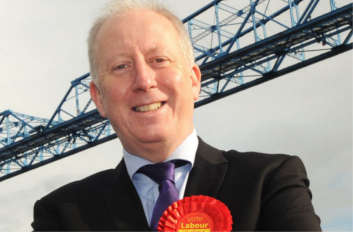Labour’s shadow transport secretary has accused the Department for Transport (DfT) of ‘paying lip service to climate change’ and pledged that a Labour government will align the department’s priorities with its commitment to tackle the issue.
Andy McDonald MP set out Labour’s plans for the Department for Transport in a keynote speech at the Institute for Government this week.
He said: ‘Transport is the UK’s single largest source of greenhouse gas emissions and the worst-performing sector when it comes to reducing carbon emissions.

>
‘Labour will align the priorities of the Department for Transport with our commitment to tackle climate change. We will put an end to a Department that only pays lip service to climate change, and instead will ensure it puts at its core our moral responsibility to cut emissions and allocates departmental spending as if climate change really matters.’
‘Labour want to see the Department set a carbon budget consistent with the aspirations of the Paris Agreement on climate change. Moreover, Labour wants each of the sectors – rail, road, aviation and maritime – to have carbon reduction targets in line with that departmental budget.'
He added: ‘The next Labour government intends to drive a Green Industrial Revolution. Transport, and the railway in particular, was at the heart of the Industrial Revolution. And so those greenest forms of transport with the railway at the forefront, are critical to our plans for a Green Industrial Revolution.’
Mr McDonald also criticised the DfT for what he called ‘the dominance of short-term thinking over long-term strategies’.
On the question of whether government should invest in high speed rail or the existing network, he said: ‘It’s not a question of either-or. It is both', but he warned that ‘there will be no blank cheque from Labour’.
Looking back at the last Labour government, Mr McDonald said its biggest mistake on transport was ‘not facing down the fuel protesters in 2000 when the party was at the height of its powers', a decision that ‘led to a huge distortion in both the public finances and how the financial burden has fallen across the modes of transport which we still live with today’.
He hinted at possible changes in tax and spending in transport, contrasting the freeze in fuel duty and air passenger duty since 2010 with increases of more than a third in rail and bus fares up. He said: 'This is not a sensible approach to transport policy.'
In response, AA president Edmund King said: 'Any hike in fuel duty will be seen as an attack on the economy particularly with the increase in self-employment coupled with the largest increases in van registrations ever. We need to promote incentives for drivers to switch to greener vehicles rather than looking at measures to tax them more.'
Labour’s plans:
- A new Clean Air Act ‘to deal with the Conservative legacy of illegal air quality’
- Enabling the expansion of public transport by bringing the railways back into public ownership, capping fares, and supporting the creation of municipal bus companies
- Instigating a rolling programme to steadily electrify the railway
- Completing HS2 from London through Birmingham to Leeds and Manchester and then into Scotland
- Linking HS2 with other rail investments, such as Crossrail of the North
- Upgrading the rail network in the South West, following the recommendations of the Peninsula Rail Task Force
- Encouraging greater use of public transport by introducing free bus travel for under 25s where local authorities regulate or take ownership of their local bus services, paid for using money ring-fenced from Vehicle Excise Duty
- Encouraging expansion of freight services in a publicly-owned railway
- Positioning the UK at the forefront of the development, manufacture and use of ultra-low emission vehicles
- Guaranteeing that any airport expansion adheres to its ‘tests’, which require ‘noise issues to be addressed, air quality to be protected, the UK’s climate change obligations met and growth across the country supported’.
Register now for full access
Register just once to get unrestricted, real-time coverage of the issues and challenges facing UK transport and highways engineers.
Full website content includes the latest news, exclusive commentary from leading industry figures and detailed topical analysis of the highways, transportation, environment and place-shaping sectors.
Use the link below to register your details for full, free access.
Already a registered? Login